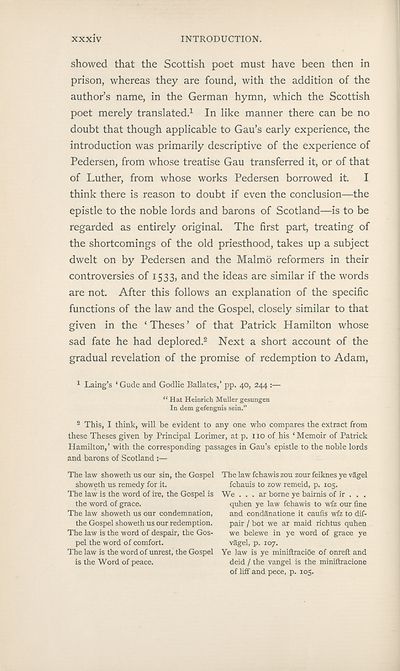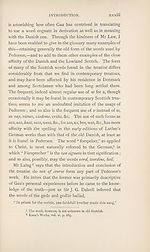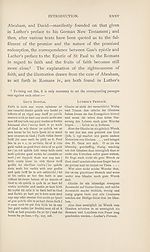Scottish Text Society publications > Old series > Richt vay to the Kingdome of Heuine
(40) Page xxxiv
Download files
Complete book:
Individual page:
Thumbnail gallery: Grid view | List view

XXXIV
INTRODUCTION.
showed that the Scottish poet must have been then in
prison, whereas they are found, with the addition of the
author’s name, in the German hymn, which the Scottish
poet merely translated.1 In like manner there can be no
doubt that though applicable to Gau’s early experience, the
introduction was primarily descriptive of the experience of
Pedersen, from whose treatise Gau transferred it, or of that
of Luther, from whose works Pedersen borrowed it. I
think there is reason to doubt if even the conclusion—the
epistle to the noble lords and barons of Scotland—is to be
regarded as entirely original. The first part, treating of
the shortcomings of the old priesthood, takes up a subject
dwelt on by Pedersen and the Malmo reformers in their
controversies of 1533, and the ideas are similar if the words
are not. After this follows an explanation of the specific
functions of the law and the Gospel, closely similar to that
given in the ‘Theses’ of that Patrick Hamilton whose
sad fate he had deplored.2 Next a short account of the
gradual revelation of the promise of redemption to Adam,
1 Laing’s ‘Gude and Godlie Ballates,’ pp. 40, 244 :—
“ Hat Heinrich Muller gesungen
In dem gefengnis sein.”
2 This, I think, will be evident to any one who compares the extract from
these Theses given by Principal Lorimer, at p. no of his ‘Memoir of Patrick
Hamilton,’ with the corresponding passages in Gau’s epistle to the noble lords
and barons of Scotland :—
The law showeth us our sin, the Gospel
showeth us remedy for it.
The law is the word of ire, the Gospel is
the word of grace.
The law showeth us our condemnation,
the Gospel showeth us our redemption.
The law is the word of despair, the Gos¬
pel the word of comfort.
The law is the word of unrest, the Gospel
is the Word of peace.
The law fchawis zou zour feiknes ye v2gel
fchauis to zow remeid, p. 105.
We . . . ar borne ye bairnis of ir . . .
quhen ye law fchawis to wfz our fine
and condanatione it caufis wfz to dif-
pair / bot we ar maid richtus quhen
we belewe in ye word of grace ye
vStgel, p. 107.
Ye law is ye miniftracioe of onreft and
deid / the vangel is the miniftracione
of liff and pece, p. 105.
INTRODUCTION.
showed that the Scottish poet must have been then in
prison, whereas they are found, with the addition of the
author’s name, in the German hymn, which the Scottish
poet merely translated.1 In like manner there can be no
doubt that though applicable to Gau’s early experience, the
introduction was primarily descriptive of the experience of
Pedersen, from whose treatise Gau transferred it, or of that
of Luther, from whose works Pedersen borrowed it. I
think there is reason to doubt if even the conclusion—the
epistle to the noble lords and barons of Scotland—is to be
regarded as entirely original. The first part, treating of
the shortcomings of the old priesthood, takes up a subject
dwelt on by Pedersen and the Malmo reformers in their
controversies of 1533, and the ideas are similar if the words
are not. After this follows an explanation of the specific
functions of the law and the Gospel, closely similar to that
given in the ‘Theses’ of that Patrick Hamilton whose
sad fate he had deplored.2 Next a short account of the
gradual revelation of the promise of redemption to Adam,
1 Laing’s ‘Gude and Godlie Ballates,’ pp. 40, 244 :—
“ Hat Heinrich Muller gesungen
In dem gefengnis sein.”
2 This, I think, will be evident to any one who compares the extract from
these Theses given by Principal Lorimer, at p. no of his ‘Memoir of Patrick
Hamilton,’ with the corresponding passages in Gau’s epistle to the noble lords
and barons of Scotland :—
The law showeth us our sin, the Gospel
showeth us remedy for it.
The law is the word of ire, the Gospel is
the word of grace.
The law showeth us our condemnation,
the Gospel showeth us our redemption.
The law is the word of despair, the Gos¬
pel the word of comfort.
The law is the word of unrest, the Gospel
is the Word of peace.
The law fchawis zou zour feiknes ye v2gel
fchauis to zow remeid, p. 105.
We . . . ar borne ye bairnis of ir . . .
quhen ye law fchawis to wfz our fine
and condanatione it caufis wfz to dif-
pair / bot we ar maid richtus quhen
we belewe in ye word of grace ye
vStgel, p. 107.
Ye law is ye miniftracioe of onreft and
deid / the vangel is the miniftracione
of liff and pece, p. 105.
Set display mode to: Large image | Zoom image | Transcription
Images and transcriptions on this page, including medium image downloads, may be used under the Creative Commons Attribution 4.0 International Licence unless otherwise stated. ![]()
| Publications by Scottish clubs > Scottish Text Society publications > Old series > Richt vay to the Kingdome of Heuine > (40) Page xxxiv |
|---|
| Permanent URL | https://digital.nls.uk/113770340 |
|---|
| Description | A collection of over 100 Scottish texts dating from around 1400 to 1700. Most titles are in Scots, and include editions of poetry, drama, and prose by major Scottish writers such as John Barbour, William Dunbar, Gavin Douglas, and George Buchanan. Edited by a key scholarly publisher of Scotland's literary history, and published from the late 19th century onwards by the Scottish Text Society. Available here are STS series 1-3. |
|---|

